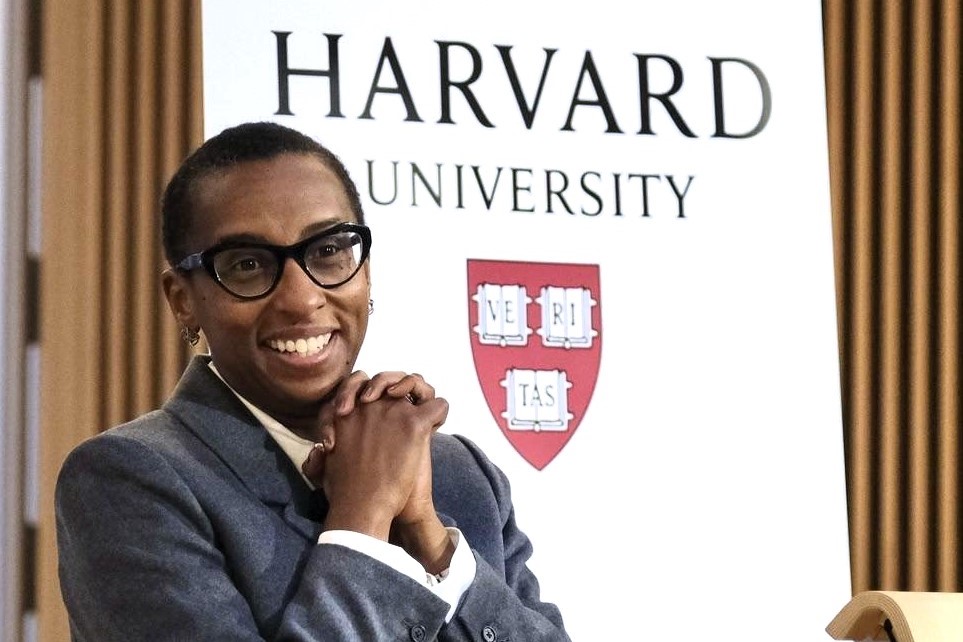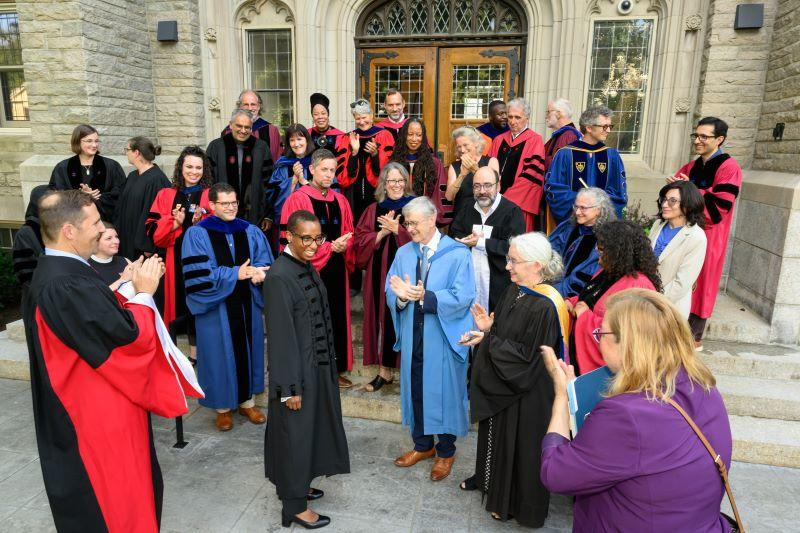
I've never met Claudine Gay, but I know Claudine Gay.
We both went to grad school at Harvard in the government department (what they call political science pretty much everywhere else), me from 1986-1991 and Gay from 1992-1998. We both got a masters degree and Ph.D. there. We both had the same dissertation advisor, famed statistical methodologist and all around nice guy Gary King, yet neither of us were statistical methodologists at heart. We both used regressions and econometrics as a toolkit to help us answer questions that we wanted to explore, Gay in American politics and me in international relations, and we were perfectly proficient with the tools, but we didn't really care about the tools. We cared about the questions. I didn't overlap with Claudine Gay chronologically at Harvard, but I overlapped 100% with the classes and the places and the people and the life.
After graduation we both did the tenure track publish-or-perish thing, but here the close similarities stop. Gay had a significantly more successful academic career than I did. I had a good start at NYU but ended up with tenure at SMU, which is pretty much a dead end in prestige academic terms. Looking back now, I can see how impatient I was with the game of academia and how poorly I played it. Gay started at Stanford and ended up with tenure at Stanford, which is anything but a dead end. Harvard brought her back with a full professorship within two years of that. Gay was patient, and she played the game extremely well.
Interestingly, we both stopped teaching a few years after getting tenure. Me to co-found a software company, which required leaving academia completely, Gay to go into university administration as a dean, which locked her into academia for life. There but for the grace of God ... I am SO lucky that I got out when I did.
I'll be saying a lot of critical things about American higher education in this note. I mean, it's got "Intellectual Rot" in the title, so I think you can tell where this is going. And throughout this note I'll be coming back to Claudine Gay as a manifestation of that rot, which will come across to some as if I'm saying critical things about her. I'm not. Or rather, I am, but not in the way that you probably think.
I've lived that life. I know that life. I know that Claudine Gay is an incredibly smart and accomplished human being. I know that anyone who believes that Claudine Gay is some sort of DEI or affirmative action hire, even in her miserably failed role as university president, is completely mistaken. I know that Claudine Gay is neither a 'plagiarist' nor an 'antisemite' in any reasonable sense of those words. But I also know this:
It's so much worse than that.
My god, if only Claudine Gay were an antisemitic plagiarist faker who conned everyone to undeservedly take the helm of Harvard University! How much easier this would all be if that were true, and we could 'solve' the problem by purging Claudine Gay and all the other Claudine Gays from American higher education.
But it's not true. It's not true at all.
The problem is not Claudine Gay. On the contrary, Claudine Gay is exactly the sort of person you would want to hire for your meritocratic organization. She would have absolutely killed it at Bridgewater or Citadel or (lol) Bill Ackman's Pershing Square if that's how she had wanted to apply her abilities.
The problem is the office of a university president or dean. The problem is the system of university administrators and faculty. The problem is the role of higher education in modern society, transformed from investment good into consumption good, serving as a gigantic Hogwarts sorting hat while masking an increasingly rigid and polarized caste system beneath.
The problem is the intellectual rot of the modern University that perverts and diminishes the works of its faculty and administrators, no matter how smart they are, no matter how accomplished they are, no matter how well-intentioned they are, a rot that requires plagiarism and promotes antisemitism.
Exactly like the medieval Church.
In form and function, the modern University IS the medieval Church. Our colleges and universities today play the same roles in American society as the Catholic Church played in European society for a thousand years, physically permeating every city and town, economically permeating every hierarchy of work, emotionally permeating every family, intellectually permeating every text. Americans today set the calendar and the cadence of their lives through their educational system in the same way that Europeans 800 years ago set the calendar and cadence of their lives through their religious system.
Did you know that one in every 11 Americans with a job (May 2022 data) works in educational services? The only sector that employs more Americans is healthcare. Within that broad category of educational services, three million Americans work for colleges, universities and professional schools, and about half that number are faculty of one sort or another. One and a half million college professors, all suspended in an enormous hierarchy of rank and titles, all supported and governed by an equally enormous and stratified bureaucracy of one and a half million staffers and administrators. We've changed the words ... deacon, monk, priest, abbot, bishop, archbishop, cardinal have become adjunct, lecturer, professor, dean, provost, president, chancellor ... but we've kept the structures and the forms. We've even kept the clothes.

Everywhere you look in America, you see the University. Colleges and universities are one of the top employers and top landowners in every city and town in the country. Every airport, every bus stop, every commuter rail station is plastered with their billboards and advertisements. Every weekend and most every night your TV offers up hours and hours of live sports programming from colleges and universities. Growing up in North Alabama, I joke that I grew up in the Church of Bear Bryant, but it's not really a joke.
One hundred and forty-five million Americans are current or former college students, all sharing essentially the same multi-year experience.
One hundred and forty-five million.
The University is an Industrially Necessary institution, meaning that it is irreplaceable in our social fabric and is legitimized through immensely powerful belief structures. These belief structures are largely tacit, not because they're weakly held, but on the contrary because they are universally held and not at all up for debate. In other words, as powerful and omnipresent as the physical institution of higher education is in our lives, our shared belief - our faith! - in the institution of higher education is even more powerful and omnipresent. Our most fundamental Common Knowledge structure - what we all know that we all know! - is this:
Getting a good education from a good college is the path to a better life for ourselves and our children and our children's children. Amen.
This is the shared belief of every American, regardless of race, class, age, religion, ethnicity or political party. Understand this, and you understand American society and politics and economics in the year of our lord 2024 at a tectonic level. Replace "a good education from a good college" with "God's blessing from the Church" and you understand European society and politics and economics in the year of our lord 1517 in the same way.
But just as higher education today has the same social importance and central social role as religion in the Middle Ages, it also has the same failings. Cultural elitism, economic rapaciousness, intellectual rot ... everything we complain about the University today was complained about the Church then. The specific complaints were different - I mean, plagiarism and antisemitism were considered features in the Middle Ages, not bugs - but for all its centrality to everyday life, there was at least as much muttering and complaining about priests and bishops then as about professors and university presidents today. Still, "Yay, Church!" provided an ample Narrative shield against any break in the common knowledge structure, just as "Yay, College!" does today.
Until this guy came along.

I give you Johann Tetzel, the Claudine Gay of 1517.
Tetzel wasn't as smart or accomplished as Gay. He was a friar and an inquisitor, not an archbishop like a Harvard president would have been back in the day, and he wasn't an administrator at all. He was a salesman. And what he sold were indulgences, a get-out-of-purgatory-free card - a literal piece of paper - signed by your local bishop or archbishop, that would reduce the punishment you would receive in the afterlife for your sins before you were allowed to enter heaven. There's a long history of indulgences in the Catholic Church, all stemming from the idea that the good works you do in this world should have some reward in the next, with the result that lots of churches and hospitals and orphanages and the like were built by rich guys as penance for their sins. Nice! But you can probably see where this is going. Hey, why don't we cut out the real-world building of churches and hospitals and orphanages, and just sell these indulgences for cash to the mass affluent market? And hey, why should these indulgences be limited to people alive today as forgiveness for their sins, when we could sell them to grieving descendants of the dead as forgiveness for their sins? I mean, who isn't gonna pay up to whack 10 years off the purgatory sentence for dearly departed granny and get her through those Pearly Gates pronto? To put it in terms that my Wall Street friends will understand: in the early 1500s the Catholic Church securitized an afterlife-backed promissory note to pay down its construction loans and fund a special dividend to senior management, and Johann Tetzel was the lead derivative sales guy.
And he botched it.
Exactly like Claudine Gay, Tetzel waaay overplayed his hand. He was too eager. He couldn't read the room. When a hostile Republican Congresswoman German bishop publicly asked him if his DEI policies indulgences allowed for students to call for the death of Jews and the destruction of Israel parishioners to purchase forgiveness for future sins not yet committed, he doubled-down on a legalistic, procedural explanation of indulgences and ignored their obvious perversion of the original virtues they were intended to support.
Exactly like Claudine Gay, Johann Tetzel was a catalyst for fundamental change in the University Church.

On October 31, 1517, Martin Luther sent a long email letter to his bishop complaining about Tetzel's sale of indulgences in Germany to fund the Pope's construction of St. Peter's (yes, that St. Peter's! the St. Peter's!), and he tweeted posted his “95 Theses” thread paper on the door of the Wittenberg church. Not only did Luther's observations about the blatant antisemitism, plagiarism and woke bullshit corruption in the Catholic Church strike a chord with the general public, particularly among those who had paid up for a crazily expensive diploma indulgence that Luther said was probably worthless, but it also mobilized many Republican politicians German princes and electors who saw this as a powerful wedge issue they could use in their power struggle with Democrats the Pope. And thus the Protestant Reformation was born.
Luther pointed to two pillars of the Catholic Church that specifically allowed the securitization of indulgences and more generally poisoned the Church's core mission by creating a system of offices and roles that perverted and diminished the efforts of all priests and bishops, no matter how smart or accomplished or well-meaning they were.
1) Divine truth can only be understood through learned intermediaries who interpret and teach the holy texts, not directly from the holy texts themselves.
2) Eternal reward can be achieved through externally-expressed good works and externally-expressed observation of the proper forms, without reference to an internally-held faith.
Luther's answer to this intellectual rot at the heart of the Catholic Church came in two phrases: sola scriptura and sola fides.
Sola scriptura means “by the Bible alone”. It's a rejection of the Catholic doctrine that the path to understanding God's Word is only through an institutionalized priesthood that interprets the Bible for you and teaches you its true meaning. Instead, Luther wrote - as did Peter - that all baptized Christians are a priesthood in and of themselves, each able to understand and interpret the Bible directly, without intermediation.
Sola fides means “by Faith alone”. It's a rejection of the Catholic doctrine that good deeds on Earth, in and of themselves, have a reward in the afterlife. Instead, Luther wrote that eternal reward comes from living an authentic (i.e., externally and internally consistent) life of Faith. Doing good deeds on Earth is an effect of living an authentic life of Faith, not a cause for some payoff after you're dead.
The two fundamental faults of the Catholic Church in the Middle Ages:
1) truth can only be known through an institutionalized caste of learned intermediaries
2) external, procedural displays of 'virtue' are prized and rewarded in and of themselves
Are the same fundamental faults of American Higher Education today.
Not kinda sorta the same fundamental faults, but exactly the same fundamental faults. The University expresses these faults secularly today and the Church expressed these faults religiously then, but there's zero difference between University and Church in the essence of their failings.
And here's the kicker, true then and true now: the larger these institutions become, the worse these failings become at an increasing rate. Why?
Because there is no scalable way to demonstrate authentic learnedness.
Because there is no scalable way to demonstrate authentic virtue.
There is no way to keep score in institutionalized academia or institutionalized religion like there is in institutionalized markets (money) or institutionalized politics (votes), meaning that there is no internally consistent and externally verifiable clearing mechanism for learnedness or virtue at scale.
And so we fake it.
We fake learnedness and virtue at scale.










Found a good quote from Claudian:
Emitur sola virtute potestas.
(True) power is purchased by virtue alone.
“Academics aren’t fake; they are our best. But they are trapped in a system that sucks that positive energy right out of their souls, that fakes learnedness and virtue at scale, that perverts and diminishes their work, yes, but even more so them.
I know that a lot of them get it. I know that a lot of them will join us in our efforts to reshape the University through internal reform.”
Wow. How to distribute this remarkable piece of work to where it can have the most effect? I know that we can email a link, but those easily get buried or deleted unless they go to an existing ally. If I had a paper copy with a catchy front cover I would personally deliver it to my local University’s DEI office and physically hand it to a person there with an admonition which would hopefully entice someone within the office to read it and pass it around.
And if nobody was around I would tape it up in a prominent location within that office, along with a brief sticky note in red marker.
You could. It will not work. The DEI people would ignore the substance of the argument and quite likely dog-whistle to each other that you are racist trash simply because you do not agree 100% with them. Your perceived external threat to them would allow them to reaffirm to each other the unique and vital role of their office to defend against the racist trash anti-DEI hordes, including yourself.
If you are lucky and they are not smart, one of them might leak it for awareness-raising purposes or otherwise cause it to go viral, effectively spreading Ben’s argument. If you are unlucky or they are smart, they will just recycle your paper.
Upton Sinclair best stated the core problem: “It is difficult to get a man to understand something when his salary depends upon his not understanding it!”
I don’t know how to make change come from the inside of universities when so many allied and powerful people are dependent on their job roles not changing, or think they are. Ditto with the federal bureaucracy.
My hunch is that the only peaceful way to change academia is by finding new jobs for most of the people who now work in academia.
I also like the idea of creating parallel structures to academia. But to last, I imagine they’d have to be created by some crazy idealist with a ton of money and a master plan including what to do about backsliding. Otherwise the new structure will be easily corrupted by greed.
Coding bootcamps are one example of such a parallel educational structure. My shallow understanding is that some are great (most students can easily find jobs for relatively not a lot of tuition) and others are corrupted (most students pay big bucks for not a lot of useful knowledge or job prospects).
Exactly, and how it gets presented matters. The pitch would be something like:
“This is circulating and it’s catching people’s attention. You might want to become familiar with it as it has the potential to put you in a really defensive position. Knowledge is power.”
Luck is where opportunity and preparedness meet. Catalysts are commonly required for a difference to be made.
If anyone even hints that I’m racist trash - I’m ready.
I dig it. Curious to hear what happens.
Oh, they won’t hint it to you, just to each other. If you post it on DEI’s door or step into the office and give it to the front office person sitting there, they will be incredibly polite and formal as their goal will be to get this crazy dude out of their office in roughly 2.0. The front office person will not read it, as they are overloaded with enough bureaucratic nonsense already and reading it will not make them any more money. But if you’re lucky, they will give it to their boss and both will giggle a little.
And but curiosity #2: What is your planned response if they did hint that you were racist trash?
In my corporate days, Compliance was the DEI of the day (at least in my co); reputation risk, what you right in emails, harrassment, insider trading…
All legitimate and material issues. Compliance is necessary and it was healthy.
But the creep began, Compliance Summits, monthly trainings, the staffing (orgs just like Ben outlined). The problem was there were few issues for them to deal with - their reports showed very few issues being worked on - but the problem was NOT that the company and it’s people were pretty damn “compliant” - the problem WAS the people being hesitant to raise the issues. Ah yes,
The bad stuff had to be there - the Compliance teams just needed to get people comfortable to divulge them…so more trainings and group “Sensing” sessions and the nudging began…was that conversation harassment due to the tone of the dialogue? Did your peer acquire something large after working on a deal (insider trading)? I heard the whispers of the investigations into benign issues (and proven to be benign).
C’mon - the Compliance Department can’t be Compliant if the company and it’s people are Compliant. The Compliance Grand Poo-Bah needs non-compliance for his/her survival/relevance.
A structure to deal with wrongs is necessary. A bureacracy to advertise to stakeholders that we are vigilant and can prevent misdeeds is wholly unnecessary.
I’ll send that to you privately. These comments here are in the public realm
While this was a remarkably descriptive write-up of how things seem to currently exist within the higher educational framework, it is exceedingly difficult to see a process by which it can be healed internally. Rather, I fear that it will be altered externally, either by a large group of companies discriminating against graduates of a certain group of universities, so the ultimate value of that degree is diminished, or by political fiat, where federal or state aid to a university will only be available with a particular ratio of students to both faculty (low ratio) and administrators, (very high ratio) which will result in universities seeing their funding diminish. after all, look how a few large donors pulling their donations from Harvard, Penn and MIT forced change. if the government stops paying, I could see real change.
But absent a revolution in Congress, I don’t see the second happening anyway.
Agree, It is the funding by government backed loans that permits the distortion to continue. Tax endowments substantially unless used for free tuition for all undergrads, re-design loan programs with limits on amounts borrowed, implement a ratio of administrators and full time faculty in order to qualify for government backed loans. Restricting the source of funds will drive eventually stop the disproportionate escalation of prices…And yes, surely I dream
I thought this was a good interview with Ben Sasse, and I think points towards a path of internal reform.
https://www.wsj.com/articles/the-harvard-of-the-unwoke-university-of-florida-is-fixing-higher-education-13f22b77